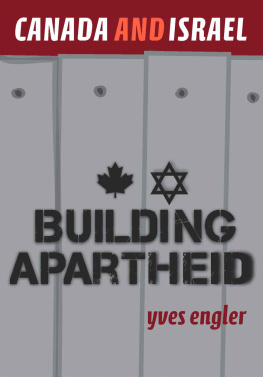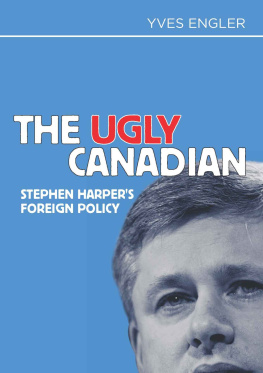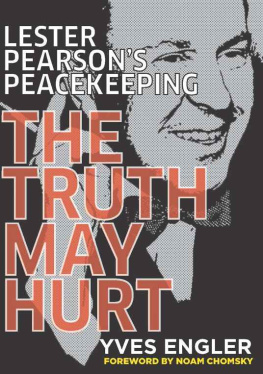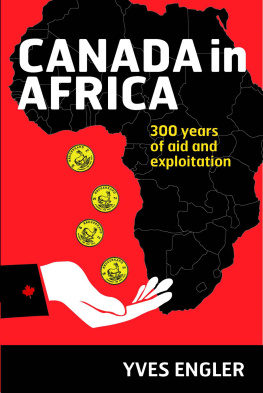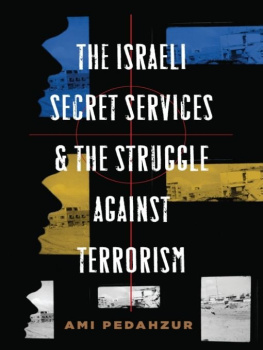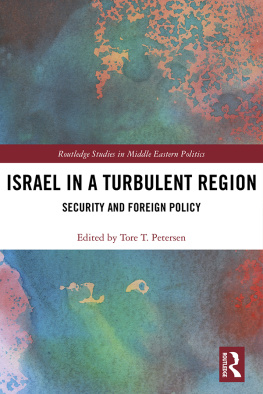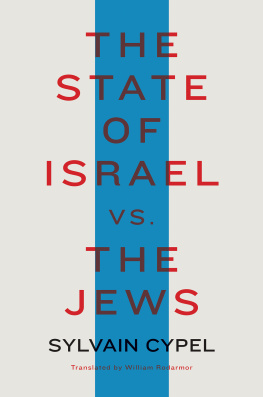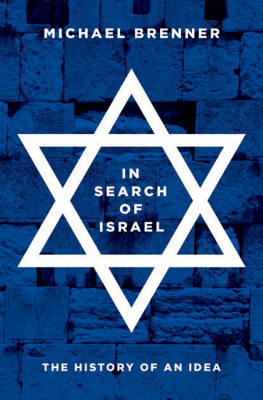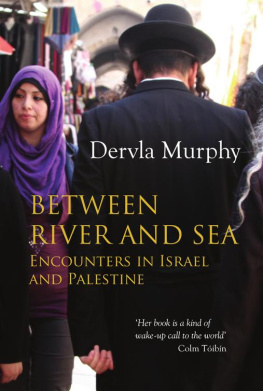Introduction
Most Canadians believe our country acts and has acted as an honest broker or peacekeeper on the world stage. While this belief may indicate a widespread desire for a democratic and humanistic foreign policy it often does not reflect reality. My Black Book of Canadian Foreign Policy was a broad overview of the subject. This work, on the other hand, is an attempt to understand Canadas role in one of the worlds longest standing conflicts. To develop a peace-promoting, altruistic Canadian foreign policy, the first step is to understand the past and current reality. Only then can we demand change. The aim of this book is to educate Canadians about what has been and is currently being done in our name in an important part of the world.
Thousands of books describe various aspects of the Palestinian/Israeli conflict. Only a handful detail Canadas ties to the dispute and most do so from a pro-Israel perspective. This is the first book to focus on Canadian support for the dispossession of Palestinians, for a state building a nation based on one religion, and for the last major European colonial project.
Most Canadians believe their government should treat all citizens equally and that everyone born in Canada is Canadian. They support the Charter of Rights and Freedoms, which bans discrimination based on religion, ethnicity and place of origin. A majority believes multiculturalism is a good a thing and are proud that people from all religious backgrounds, from every ethnicity and from every corner of the globe can be accepted as Canadian. Our constitution recognizes, and most of us believe, that First Nations have rights to their land and self-government. Despite numerous ongoing abuses, many Canadians regret the historical treatment of indigenous people and our colonial past. The federal government has apologized for some of its most egregious past behaviour.
I believe most Canadians want their government to uphold the Charter of Rights and Freedoms by following its principles when determining our foreign policy. Yet, in many respects Israel represents the antithesis of these principles. It proclaims itself a nation of one religion. It controls millions of peoples lives without allowing them to vote. It refuses to allow hundreds of thousands of people born in the land of Israel and their descendents to become citizens or even visit the country. In many ways Israels current reality resembles the worst of Canadas colonial past.
Still, this book is not about Israel, or the nature of Zionism. It does, however, begin with the position that Israel is an apartheid state.1 In recognition that this analysis is controversial in some quarters, a short explanation is necessary.
In Palestine: Peace Not Apartheid former U.S. President Jimmy Carter argues that Israels policies in the Palestinian territories constitute a system of apartheid, with two peoples occupying the same land, but completely separated from each other, with Israelis totally dominant and suppressing violence by depriving Palestinians of their basic human rights.2 On numerous occasions Nobel Peace Prize winner Archbishop Desmond Tutu has compared the treatment of Palestinians to Blacks under South African apartheid. The 1973 UN International Convention on the Suppression and Punishment of the Crime of Apartheid described the inhuman acts of apartheid as:
Denial to a member or members of a racial group or groups of the right to life and liberty of persons... By the infliction upon the members of a racial group or groups of serious bodily or mental harm, by the infringement of their freedom or dignity, or by subjecting them to torture or to cruel, inhuman or degrading treatment or punishment.
Any legislative measures and other measures calculated to prevent a racial group or groups from participation in the political, social, economic and cultural life of the country including the right to education, the right to leave and to return to their country, the right to a nationality, the right to freedom of movement and residence.
Any measures, including legislative measures, designed to divide the population along racial lines by the creation of separate reserves and ghettos for the members of a racial group or groups ... the expropriation of landed property belonging to a racial group.3
Certain aspects of Israeli reality fit this definition. Israels laws are fundamentally racist, forcing citizens and institutions to make racist decisions. Legal apartheid is regulated in Israel, notes Uri Davis, by ceding state sovereignty and investing its responsibilities in the critical area of immigration, settlement and land development with Zionist organizations constitutionally committed to the exclusive principle of only for the Jews.4 With quasi state status the World Zionist Organization, Jewish Agency and Jewish National Fund are constitutionally committed to serving and promoting the interests of Jews and only Jews.5
Through the Law of Return, my longtime friend in Vancouver, Michael Rosen, who hasnt been to Israel, has no familial connection to the country and has never even been religious can emigrate to Israel. On the other hand, Noor Tibi, a woman I met at Concordia University in Montreal whose grandfather fled from Haifa in 1948, could not enter (let alone live in) Israel until she got a Canadian passport. Justified as an affirmative action measure to protect besieged Jewry, the Law of Return becomes patently racist when Israel refuses to allow Palestinian refugees to return to their homeland.
Zionist forces expelled 87% of the Arab population from the soon-to-be Jewish state in 1947/48.6 This was the first major act of apartheid waged against Palestinians. Refusing to allow them to return is an ongoing form of apartheid. Since its establishment Israel has been in a state of emergency to keep the properties of Palestinian refugees in the hands of the state and the Jewish National Fund.7 This theft is sanctified by the Absentees Property Law of 1950.8
Most of the land Israel grabbed from Palestinians is off limits to the Arabs who remain in Israel. Almost a fifth of the population, Arabs are legally excluded from owning 93% of Israel (not including the occupied territories).9 They are also politically disenfranchised. Between 1948 and 1966 the Arab sectors of Israel were under martial law and today political parties that oppose the Jewish supremacist character of the state are outlawed.10 Article 7 (a) of Israels Basic Law stipulates that A candidates list shall not participate in the elections to the Knesset if its objects or actions, expressly or by implication, include... negation of the existence of the State of Israel as the state of the Jewish people.11
In addition to legal structures that discriminate against the indigenous Arab population, government services prioritize Jews. Despite making up 18% of the population, Arab Israelis receive about 4% of public spending.12 A March 2009 report found that the government invested [US] $1,100 in each Jewish pupils education compared to $190 for each Arab pupil. The gap is even wider when compared to the popular state-run religious schools, where Jewish pupils receive nine times more funding than Arab pupils.13 According to Israels National Insurance Institute, half of all Arab Israeli families live in poverty compared to 14% of Jewish families.14
In the West Bank, Israeli apartheid is especially obvious. The population has been pushed into bantustan-like enclaves, encircled by a massive wall, had their water and land appropriated, and are subjected to daily humiliation at military checkpoints. For more than four decades supposedly democratic Israel has dominated the West Bank population without allowing them to vote in national elections. In Gaza 1.5 million Palestinians many of whom were forced from their homes in 1947/48 live in a giant prison cut off from the world by the mighty Israeli military.
Next page
